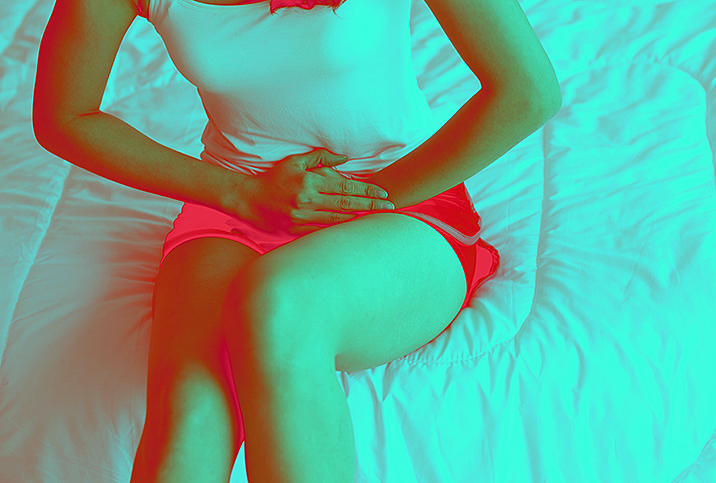Why Menopause Increases the Risk of UTIs

Along with hot flashes, night sweats, brain fog and mood changes, one of the lesser-known—but no less bothersome—symptoms of the menopausal transition is an increased risk of urinary tract infections (UTIs).
More than 50 percent of people with vaginas experience a UTI at some point, and many of those individuals have a second UTI or more within six months, according to the U.S. Department of Health & Human Services Office on Women's Health.
UTIs are common among healthy people of all ages, but once a person enters menopause, the risk of recurrent infections climbs.
"UTIs are very common in menopausal women. Previous studies have estimated that 10 percent of postmenopausal women reported having a UTI within the past year," said Amy Roskin, M.D., a Broward County, Florida-based physician and chief medical officer at Seven Starling, an online postpartum therapy company. Comparatively, the rate of UTIs is about 0.5 per person per year among younger folks.
Here's what you need to know about why UTIs occur more frequently after menopause and what you can do about it.
What are UTIs?
UTIs are bacterial infections. According to the Office on Women's Health, they usually occur in the bladder, in which case they may be referred to as cystitis or a bladder infection. UTIs can also develop elsewhere in the urinary system, including the kidneys, ureters or urethra. If they start in the bladder or urethra, they can spread to other parts of the system.
According to Mayo Clinic, symptoms typically include:
- Strong, persistent urge to urinate
- Burning sensation while urinating
- Passing frequent, small amounts of urine
- Cloudy urine
- Red, pink or brown urine
- Strong-scented urine
- Pelvic pain
Symptoms can vary depending on the infection's location. An infection in the kidneys might also produce pain in the back or side, nausea, vomiting and a fever, whereas discharge might accompany an infection in the urethra.
What causes UTIs?
Most UTIs are spurred by sexual intercourse, which can transfer harmful bacteria, such as E. coli from the rectum to the vagina and urethra. Bacteria can then enter the bladder, where they multiply.
People with vaginas are about 30 times more susceptible to UTIs than those without because their urethras are shorter, making it easier for bacteria to travel to the bladder. The urethra is also closer to the vagina and anus.
UTIs might also develop when the bladder does not empty completely, said Monte Swarup, M.D., a Chandler, Arizona-based OB-GYN and founder of the community forum HPV Hub. There are several reasons this can occur, including a stone in the ureters, kidneys or bladder blocking urine flow, a narrow urinary tract tube, or problems with the pelvic nerves or muscles.
Other risk factors among people of all ages include spermicide use and certain medical conditions, such as diabetes.
Why menopause increases the risk
Within a few years of a person's final menstrual period, physical and hormonal changes create an environment where harmful bacteria are more likely to proliferate. Contributing factors include pelvic organ prolapse, weakened pelvic floor muscles, decreased bladder volume and elasticity, and decreased estrogen levels.
"Estrogen plays a large role in the health of the vagina and urinary tract. When there is a decrease in estrogen production, the vaginal canal can become dry, thin, fragile and lose its normal elasticity," said Karla Robinson, M.D., medical editor for the online resource GoodRx and a licensed, board-certified family physician based in Charlotte, North Carolina. "Lack of estrogen also has a similar effect on the urethra and bladder. These changes can lead to urinary frequency, blood in the urine, pain with urination and increased UTIs."
here
Estrogen can fortify the bladder's natural antibacterial properties and the vagina's micro-ecosystem, Roskin and Robinson explained.
"Some recent studies have indicated that estrogen can help cells in the bladder produce naturally antibacterial compounds. This may lead to a reduction in UTIs," Roskin said. "Estrogen may benefit the vaginal microbiome and further reduce UTI risks."
Like the gut microbiome, the vaginal microbiome contains billions of microbes, most of which are beneficial. Estrogen specifically helps one type of good bacteria, lactobacillus, to thrive. These bacteria produce an acid that lowers vaginal pH and stops infection-causing bacteria from multiplying. Without sufficient lactobacillus, infections such as UTIs and yeast infections are more likely to occur.
Prevention and treatment
There are a few ways to reduce the risk of UTIs. According to Robinson, one of the most important is good bladder hygiene, which includes urinating whenever you have the urge.
"It's important not to hold your urine too long and to try and empty your bladder when you go. You may also want to try Kegel exercises to help strengthen the pelvic floor muscles," she said.
Roskin and Robinson said staying well hydrated, wiping from back to front after using the bathroom and urinating before and after sexual intercourse might help, too.
"If you have other chronic medical conditions that make you more prone to infection, such as diabetes, ensuring those conditions are managed well will also help decrease your risk of UTIs," Robinson said.
Some studies indicate alternative treatments, such as cranberry supplements, may help as well.
"While more research is needed, probiotics, vitamin D and D-mannose supplements may be useful in preventing UTIs. Cranberry supplements have also been recommended for urinary health," Robinson said. "The thought is that it decreases the ability for bacteria to thrive in the urinary tract. But the data hasn't consistently shown that it works."
'While more research is needed, probiotics, vitamin D and D-mannose supplements may be useful in preventing UTIs.'
Estrogen replacement therapies, including creams or rings, can also reduce the risk of recurrent UTIs by restoring balance to the vaginal microbiome and mitigating certain physical changes, Robinson and Roskin said.
"However, there are a number of clinical considerations and issues that go into the decision to utilize estrogen, so it's best to review with your doctor whether you are a good candidate for estrogen or other related treatments," Roskin said.
As for treatment, your doctor will most likely prescribe antibiotics, which are sometimes also used as a preventive measure for people with chronic or recurrent UTIs. However, Robinson explained this is not ideal due to the risk of antibiotic resistance, which could reduce antibiotic effectiveness in the future.
If you think you may have a UTI, don't wait. It is important to see your doctor right away so you can begin treatment and reduce the risk of complications.


















